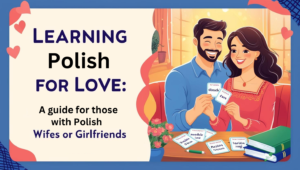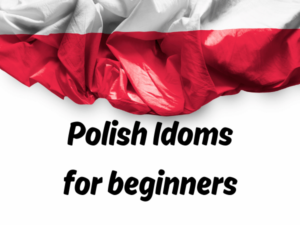If you’re learning Polish, you might have noticed the small word “by” popping up everywhere. While it seems like a tiny word, “by” is one of the most versatile elements in Polish grammar. It allows Polish speakers to express wishes, hypothetical situations, polite suggestions, and much more.

This article will break down what “by” does, how it works in sentences, and how you can use it effectively.
What is “By” in Polish?
In Polish, “by” doesn’t have a direct translation in English. Instead, it acts as a helper to form conditional, hypothetical, and polite expressions. Depending on the context, you can think of it as conveying the meanings of “would,” “could,” “might,” or “should” in English.
1. Expressing Wishes or Desires
One of the most common uses of “by” is in expressing wishes. In Polish, “by” pairs with verbs like “chciałbym” or “chciałabym” (I would like) and “życzyłbym” or “życzyłabym” (I would wish) to show what someone desires or hopes for.
Example:
- Polish: Chciałbym, żebyś przyszła na moje urodziny.
- English: I would like you to come to my birthday.
In these cases, “by” allows speakers to show that their statement is conditional – it’s something they hope will happen, rather than something certain.
How to use it: Pair “by” with verbs that express wishes, such as “chciałbym” (I would like) and “życzyłbym” (I would wish).
2. Forming Conditional Sentences
Conditional sentences (the “if… then…” sentences) are very common in all languages. In Polish, “by” is used with “gdyby” (if) to create hypothetical statements.
Example:
- Polish: Gdybyś miała czas, poszłabym z tobą do kina.
- English: If you had time, I would go to the cinema with you.
Here, “by” allows us to introduce a hypothetical condition: if the other person had time, the speaker would go to the cinema.
How to use it: Combine “by” with “gdyby” (if) and verbs in conditional forms to make your sentence hypothetical. This type of construction typically translates to “if… would” or “if… could.”
3. Making Suggestions and Recommendations
“By” is also used to make suggestions or polite recommendations. In these cases, it softens the suggestion, making it sound like a gentle “should” or “might.”
Example:
- Polish: Może byśmy coś zjedli?
- English: Maybe we should eat something?
When you want to make a suggestion in a friendly, non-demanding way, adding “by” helps you sound more polite and relaxed.
How to use it: Pair “by” with verbs to gently propose ideas, making your suggestion sound casual.
4. Expressing Unreal or Imagined Situations
If you want to talk about something that didn’t happen but could have happened, “by” is your go-to word. You’ll often see this with phrases like “gdyby tylko” (if only) to talk about missed opportunities or unreal situations.
Example:
- Polish: Gdyby tylko wiedział, powiedziałby nam prawdę.
- English: If only he had known, he would have told us the truth.
In this case, “by” creates an imagined or hypothetical version of events.
How to use it: Combine “by” with past-tense verbs to reflect on unreal situations.
5. Creating Polite Requests
Finally, “by” can make requests sound more polite. Just like how we soften requests in English with “could” or “would,” Polish speakers use “by” to make a request gentler.
Example:
- Polish: Czy mógłbyś mi pomóc?
- English: Could you help me?
This phrasing adds a level of politeness that’s ideal for formal or polite conversations.
How to use it: Use “by” with verbs in the conditional form to ask for something in a polite, respectful way.
The Grammar of “By”: Tips for Mastering It
Understanding the different ways “by” can be used is essential, but knowing where to place it in a sentence is just as important. Here are some grammar tips to keep in mind:
- Placement: “By” is often attached directly to the verb, making it part of the verb form (e.g., zrobiłby for “he would do”).
- Verb Forms: When you use “by” in a sentence, the verb typically shifts to a conditional form, ending in “-by,” “-bym,” “-byś,” and so on, depending on who is doing the action.
Practical Examples of “By” in Different Contexts
Here’s a quick reference table for seeing “by” in action across different contexts:
| Context | Polish | English Translation |
|---|---|---|
| Wish | Chciałbym, żebyś była tutaj. | I would like you to be here. |
| Conditional | Gdybyś tam była, wszystko by się udało. | If you were there, everything would have worked out. |
| Suggestion | Może byśmy poszli na spacer? | Maybe we should go for a walk? |
| Unreal Situation | Gdyby tylko miał więcej czasu… | If only he had more time… |
| Polite Request | Czy mogłabyś mi pomóc? | Could you help me? |
Wrapping Up
Mastering “by” will open up a whole new world of Polish expression for you. Whether you’re making polite requests, imagining hypothetical situations, or expressing a wish, “by” will be essential for sounding natural and polite in Polish. Start using it in your sentences, and over time, it’ll become a natural part of your Polish conversations.



